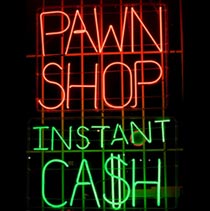
Much talk has been made of the credit crunch, European debt, the Coalition Budget and its resulting austerity measures. Life in Britain is expensive, and with the VAT and National Insurance rise, it’s only going to get worse.
So how does the average person cope when money begins to run out? Well one industry that seems to be prospering is the pawn shop, with reports suggesting that more and more members of the middle classes are pawning off their possessions in a bid to raise some extra cash.
The amount of pawn shops dotted around the high streets of England has skyrocketed, with treble the amount there were seven years ago, and companies such as H&T and Albemarle & Bond have reported massive profits in 2010.
So how did an industry that has long been associated with the dregs of society managed to shake of its seedy reputation and thrive as a legitimate way to secure some cash? Des Milligan, head of the National Pawnbrokers Association (NPA), cites economic worries and changing attitudes: “The modern pawnbroker is a cross between a jewellery shop and a building society. More middle-class people have been attracted to pawnbrokers because of the credit crunch.”
Frances Walker, of the Consumer Credit Counselling Service (CCCS), recognises the appeal of pawn shops, but suggests that people, if they have to use them, are clued up: “It's not particularly desirable, but we do understand why people do it. It's not the worst way of getting cash. If you do it, you need to understand the rules and regulations, and make sure that the broker you go to is a member of the National Pawnbrokers Association.”

